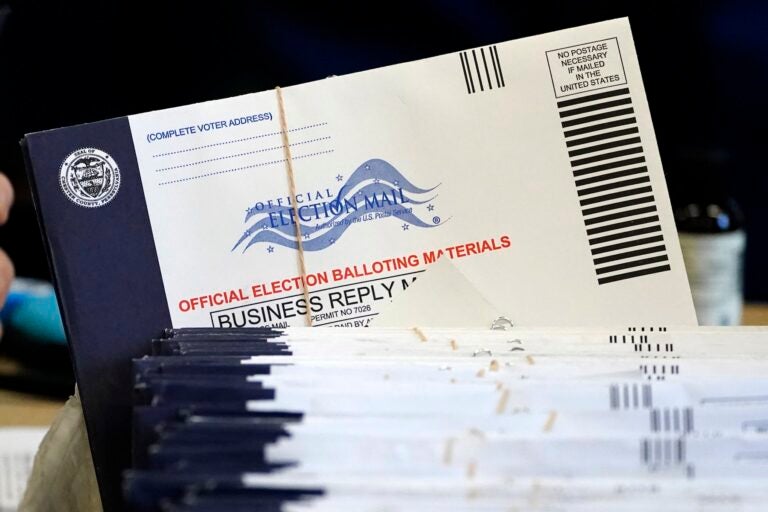Court stops Pennsylvania counties from throwing out mail-in votes over incorrect envelope dates
A state court is halting enforcement of a requirement that voters include accurate, handwritten dates on envelopes used to submit mail-in ballots.

FILE - Chester County, Pa., election workers process mail-in and absentee ballots at West Chester University in West Chester, Pa., Nov. 4, 2020. (AP Photo/Matt Slocum, File)
A state court Friday halted enforcement of a requirement that voters include accurate, handwritten dates on envelopes used to submit mail-in ballots, a ruling likely to keep several thousand Pennsylvania votes from being thrown out in the November election.
In a decision handed down as the state is being hotly contested in the presidential contest, Commonwealth Court ruled 4-1 that disqualifying voters who failed to include the date violates the state constitution’s clause that addresses “free and equal” elections.
“The refusal to count undated or incorrectly dated but timely mail ballots submitted by otherwise eligible voters because of meaningless and inconsequential paperwork errors violates the fundamental right to vote” in the Pennsylvania Constitution, wrote Judge Ellen Ceisler in the majority opinion, siding with the left-leaning groups that sued three months ago.
Pennsylvania is widely seen as a critical battlefield state in the race between former President Donald Trump and current Vice President Kamala Harris, and the 2016 and 2020 presidential contests in the state were both very close.
The number of mail-in ballots that might otherwise be disqualified for lacking accurate exterior envelope dates is comparatively small in a state where more than 6 million votes will be cast this fall, perhaps exceeding 10,000.
Evidence in litigation surrounding the requirement has indicated older voters have been more likely to have their ballots thrown out for lack of an accurate handwritten date. Far more Democrats than Republicans vote by mail in Pennsylvania.
In a lone dissent, Judge Patricia McCullough said the majority showed “a wholesale abandonment of common sense,” ignoring more than a century of legal precedent and rewriting the 2019 state law that dramatically expanded mail-in voting.
“I must wonder whether walking into a polling place, signing your name, licking an envelope, or going to the mailbox can now withstand the majority’s newly minted standard,” McCullough wrote.
The case was brought against the secretary of state and the election boards in Philadelphia and Allegheny County, which includes Pittsburgh. State and national Democratic Party groups joined the lawsuit, supporting its goals.
Democratic Gov. Josh Shapiro posted on social media that the ruling was “a victory for Pennsylvanians’ fundamental right to vote.”
The office of Secretary of State Al Schmidt, appointed by Shapiro, had no immediate comment about how the decision might alter its guidance to counties that run elections. In July, the Department of State told counties that return envelopes should be printed so that they already include the full year, “2024,” leaving voters to add the accurate month and day.
“Multiple court cases have now confirmed that the dating of a mail-in ballot envelope, when election officials can already confirm it was sent and received within the legal voting window, provides no purpose to election administration,” the Department of State said in a release.
Tom King, a lawyer who represent the state and national Republican Party groups in the case, said he was disappointed in the decision and “absolutely will appeal.” They had argued the Pennsylvania Supreme Court had “already rejected similar arguments regarding the constitutionality of and the meaningless underlying the dating provisions” in prior cases regarding envelope dates, Ceisler wrote.
The plaintiffs include the Black Political Empowerment Project, POWER Interfaith, Make the Road Pennsylvania, OnePA Activists United, New PA Project Education Fund, Casa San José, Pittsburgh United, League of Women Voters of Pennsylvania and Common Cause Pennsylvania.
They argued that county elections officials are able to tell whether ballots were cast in time because they are scanned and timestamped upon arrival.
The ACLU of Pennsylvania, which helped represent the plaintiffs, hailed the decision as a win for voters and democracy.
“No one should lose their vote over a simple human error that has no relevance to whether or not the ballot was received on time,” said Mike Lee, the group’s executive director, in an emailed statement.
WHYY is your source for fact-based, in-depth journalism and information. As a nonprofit organization, we rely on financial support from readers like you. Please give today.





